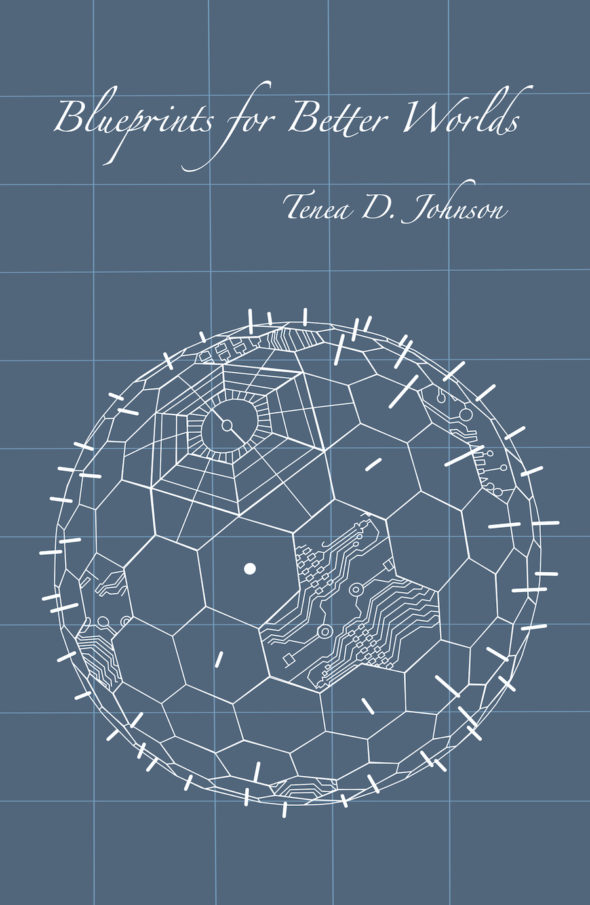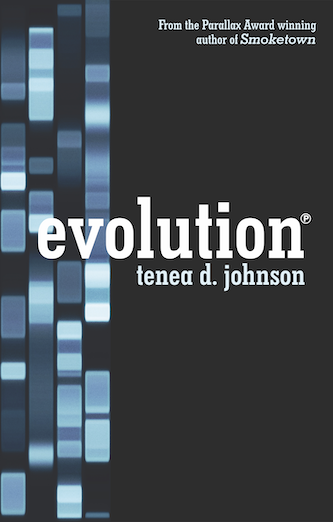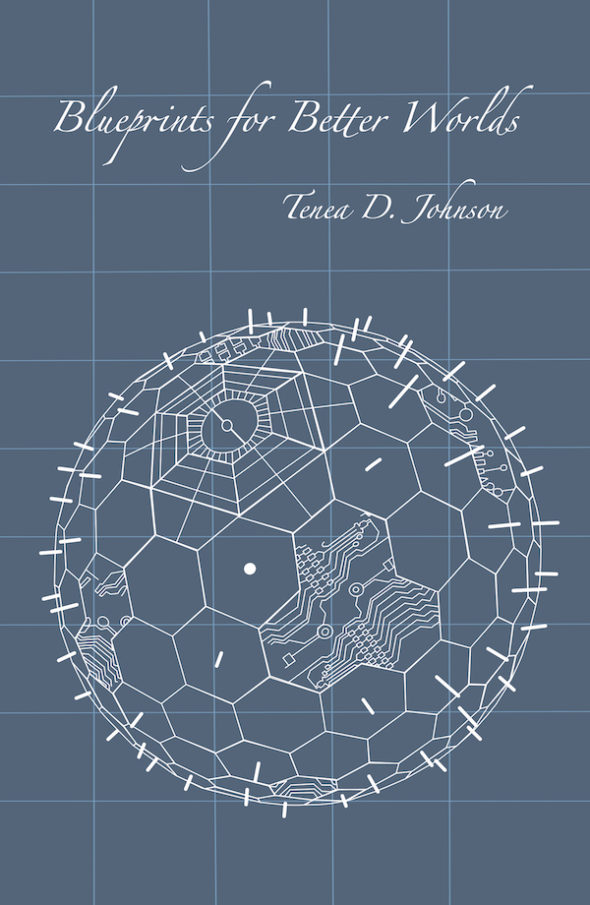New Audio Interview Available
A new audio interview is up at Gloria Sirens w/a little love for the Innovative Worlds bundle. Get the bundle through August 27th; the audio is forever (internet forever). Enjoy.
Interview: thegloriasirens.com/2020/08/25/our Bundle: storybundle.com/worlds
3 Minutes with Ginn, Author of The Long Past & Other Stories
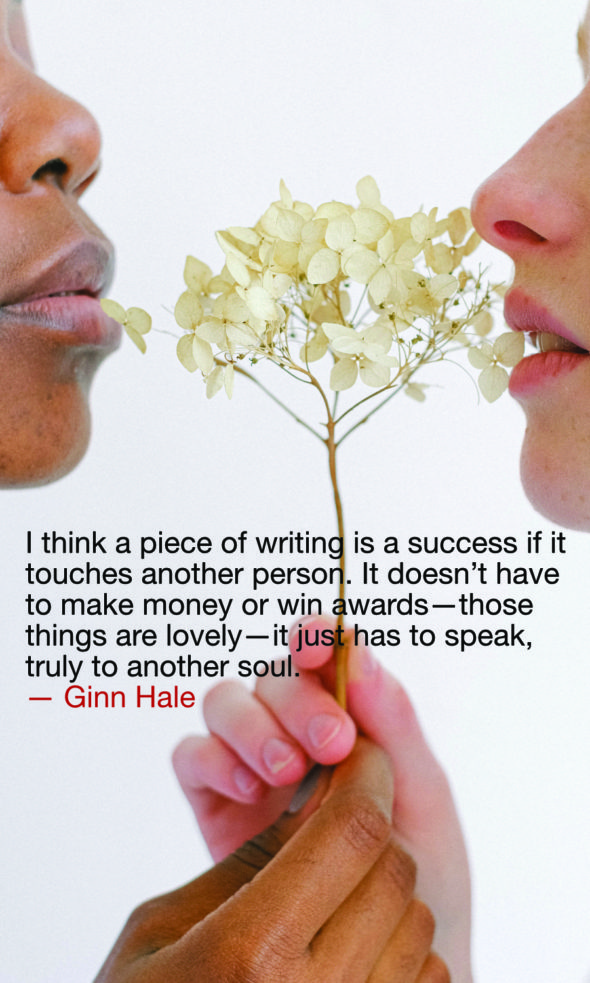
Original Photo by Anna Shvets from Pexels
There are only 3 days left for the bundle. So we end the 3 Minutes With series for the Innovative Worlds storybundle on a warm and wonderful note, with the incomparable Ginn Hale who shares her insightful views on necessary innovation, speculative fiction’s roles and gives us a glimpse into her writing life.
What innovation do you think the world most needs right now? The US?
GH: Hmm that’s a tough question—but fascinating.
Pondering it, I just realized that I often limit my idea of innovation to science alone. DNA sequencing, processor speeds, artificial intelligence, gene therapies… But innovations in social values and laws— Civil Rights, Gay Rights, Women’s Rights, the passage of the ADA—are the ones that have most improved my own life and the lives of my friends and family.
It doesn’t matter what great scientific leaps we make if they only serve to prop up inequitable societies.
Looking at it that way maybe the world might benefit most from a new economic ideal. Because right now, the most powerful nations seem driven by their economies and the current systems appear to foster worldwide inequity, reward the human exploitation and the destruction of the environment. We measure nations in terms of GDPs and devalue individuals as if they were nothing but credit scores and interest rates. When in reality our natural world and the people we share it with are the very things that enrich each of our lives the most.
What we badly need is a new concept of wealth—one that is measured by community wellbeing, human equity and environmental health.
I don’t know how such an economy would function. What would commerce look like within it? That’s where the spark of inspiration and innovation are needed—but I’d be truly excited to find out.
Does speculative fiction have a role in innovation? If so, what is it?
GH: I think that it does. I know people often cite occasions when fiction has inspired people to realize an invention or a profession. But I think fiction—particularly fantastical and speculative fiction, encourages innovation in another way as well. It helps them imagining the improbable and impossible as achievable possibilities. When readers engage with speculative fiction they practice thinking beyond the world they know to explore new paradigms. They experience alien problems and otherworldly solutions. And above all, they get to enjoy that sense of engaging with the new, unknown and unexpected. All of which, I believe, fosters a greater comfort and excitement with original concepts and innovations.
What’s on your desk?
GH: A cat. Beneath it, I can just about see my keyboard. ☺
Why this story?
GH: Because it’s the story my wife asked for. She wanted a fantastical take on the American west, where she grew up. But one that reflected the actual diversity of our friends, families and their histories… And then she threw in the request for dinosaurs! ☺
Name one darling you killed before the final draft.
GH: I desperately wanted to include a section following the adventures of “Lady” Honoria Aster, a genderfluid, 50 year-old mage and secret agent, who makes an appearance in the first section of the collection. But in a book already brimming with dinosaurs, magic and clockwork, Honoria’s trek around the world and steady transformation from spy to rebel would have filled at least one entire volume all on its own. I couldn’t make it fit, no matter how much I trimmed. So, in the end, I had to settle for mentioning the publication of H. Astor’s memoirs in the third section—maybe just to assure myself that they might someday become a reality. ☺
How do you measure writing success?
GH: I think a piece of writing is a success if it touches another person. It doesn’t have to make money or win awards—those things are lovely— it just has to speak, truly to another soul. A piece of writing can be a success even when it’s nothing more than text from my wife, telling me that she’s on her way home and that she loves me.
Do you have any writing tics?
GH: Oh yes… So many that I sometimes fear that I’m just a collection of tics, that my genius editors manage to trim into the guise of a real and whole writer. ☺
What influences your work? People, other fields, other authors, events, histories?
GH: I love science and the natural world. My Instagram is mostly pictures of plants I’ve encountered on my various rambles. My poor wife has to put up with an ever-expanding tree—named Mike—that has lived and moved with us for the past 25 years. Those things are what most inform the settings of my stories. The characters however are nearly all based on people in and around my community.
What is it about books that fascinates you?
GH: Maybe it’s because I’m dyslexic and reading has been such a hard-won skill for me, but I retain a real sense of wonder about books, and written words in particular. For the longest time books were these opaque objects–collections of pages decorated with a variety of repeating marks. Puzzle boxes, that I couldn’t figure out but every time I picked one up I could feel something secret, something amazing rolling around inside.
I remember struggling to make all the little symbols stay in place and tell me their names. It was so frustrating to fail again and again, but also so enticing to know that there might be wonders hidden in these tomes, if only I could understand them.
Then came that instant of astounding transformation—a day when those marks and their arrangement suddenly spoke to me, without making a sound. I read a word and it lit a vision in my eyes as I looked at it. I felt the faintly pebbled surface of eggshell, still warm from beneath a hen’s body. It felt like a feat of pure magic.
Of course now I feel a little embarrassed to admit that reading the three-letter sequence ‘E-G-G’ moved me to tears. But the truth is that instant felt so astonishing, so triumphant, that the sense of wonder has never completely left me. Even now I find myself gazing at some random books on a library shelf and being filled with fantastic anticipation for all the ideas, images and sensations that they might gift me if I choose to open one of them.
And when I write—as slowly as I do—I always hope that someday one of my stories might provide the same magical experience for someone else.
New Smoketown Review
The Lesbian Review had some kind words to say about Smoketown. I did not pay them; they’re safe to believe. Read them here.
3 Minutes with Bill, Co-Editor of Future Fictions: New Dimensions in International Science Fiction
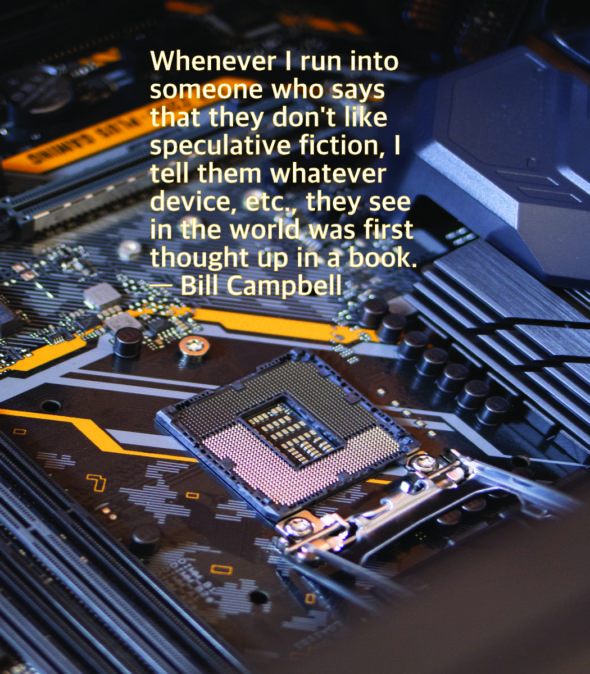
Bill Campbell, co-editor of Future Fictions, included in the Innovative Worlds storybundle available until August 27th, cracks open the door on his motivations, process, and thoughts on speculative fiction and innovation.
What’s your favorite innovation of the last 25 years? The last 5?
BC: I’m not sure. However, another music fiend and I were talking the other day about how much we love that we can access our entire music collections on our phone. If the rest of the world weren’t so clearly going to hell, I’d call this heaven!
Do you have any writing tics?
BC: The thing that annoys me most about myself, writing wise, is that before I start writing any project, I go through this excruciating period of self-flagellation where I think I’m the dumbest person on the planet and have no business writing. It takes a minute to snap out of it, but in an odd way it gives me hope because then I know I’m ready to start writing.
Does speculative fiction have a role in innovation? If so, what is it?
BC: Whenever I run into someone who says that they don’t like speculative fiction, I tell them whatever device, etc., they see in the world was first thought up in a book. But perhaps more importantly, there are questions and problems in the past, present, and future that many authors have wrestled with in their works. That’s what makes the genre so fascinating. Perhaps asking those questions is our role.
What’s on your desk?
BC: My head. I’m exhausted.
What’s the first book you really connected with? Made you cry? Laugh out loud?
BC: For me it was all about S.E. Hinton’s The Outsiders. For more reasons than I care to go into here, I pretty much felt like an outsider everywhere I went, and I definitely understood what it was like having to fight for your space. There I was, 12 years old, desperately wanting to be in a gang. Thank goodness I grew up in the suburbs of Pittsburgh where there were none. Who knows what would’ve happened to me otherwise.
3 Minutes with Eileen, Author of Questionable Practices
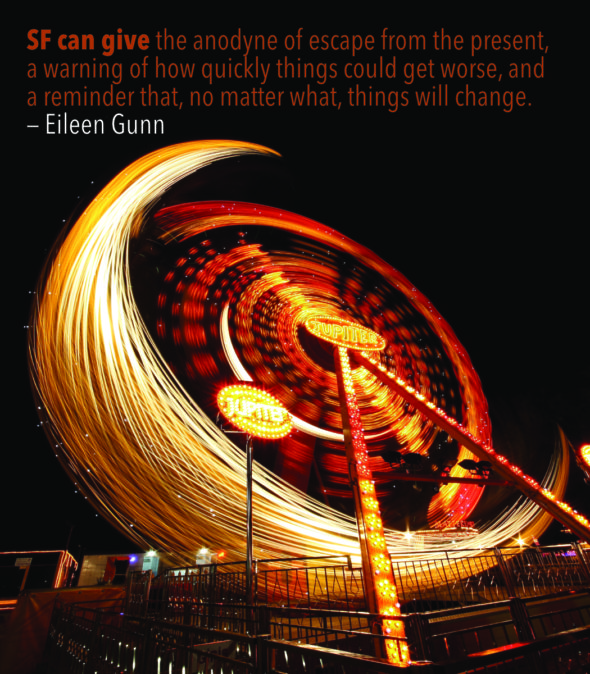
Original Photo by Engin Akyurt from Pexels
If you’re not familiar with Eileen Gunn’s Question Practices it’d be best if you were. Save yourself the trouble such ignorance causes. The Innovative Worlds bundle can help you out until August 27th. For now do yourself a favor and spend the next few minutes familiarizing yourself with her thoughts.
Does speculative fiction have a role in innovation? If so, what is it?
EG: Speculative fiction has a number of roles in innovation. (1) To young readers, at a stage when their ideas about the world are being formed, it celebrates innovation as an important force in creating our world, and it frequently makes the point that young people can drive innovation, that they can come up with ideas that make a positive difference in people’s lives. A number of prominent scientists and technologists have been inspired to enter their chosen field by reading speculative fiction as children. (2) For all readers, speculative fiction generally inculcates the idea that innovations, new ways of doing things, are to be encouraged, not feared. Humanity is always pulled between the safety of the old, tried-and-true ways of doing things, and the adventure of new, possibly risky ideas and techniques. Speculative fiction often encourages people to accept risk and do something new. (3) The problems and solutions envisioned in speculative stories have inspired scientists, technologists, social thinkers, and many other innovators to tackle those problems themselves. Sometimes their solutions were congruent with those in the stories, and sometimes they were very different, but the innovator’s attention was drawn to the problem by speculative fiction.
What’s your favorite innovation of the last 25 years? The last 5?
EG: Of the past 25 years? I’m guessing my favorite innovation is that whatchamacallit that holds my schedule and all my music and books and photos, and lets me cruise the Internet from anywhere in the world, and tells me exactly where I am and how to get to where I’d rather to be, and instantly translates dozens of languages, soI read all the menus in Chengdu and have friendly conversations with people whose language I don’t speak. That innovation.
Of the past 5 years? That’s a hard one, but probably those do-it-yourself tattoos that are like movies all over my body and they glow in the dark and I can turn them off and on. Oh, wait, we don’t get those until [checks watch] 2029. So I guess, for my favorite innovation of the past five years, I’m gonna hafta go with Zoom, which has changed my life radically for the good in the past five months. All of a sudden, I can stay in touch with my far-flung friends and relations, teach classes, and attend events all over the world from my living room. We’ve had video calls and Skype and all kinds of awkward ways of staying in visual touch with geographically distant people, but Zoom, with its remarkably short learning curve, has scaled up gracefully from 10 million calls a day last December to 300 million calls a day at the beginning of August.
Right now in the US, there’s the struggle with the pandemic, what some are calling a racial reckoning and a hotly contested, crucial race to decide who will be the next president, what part can fiction and storytelling play in such times? How can it contribute or detract?
Ursula Le Guin once said to me, “Fiction is a road to imagining a different world.” Speculative fiction, in its broadest sense, is about different worlds, about the idea that things are not the same everywhere, and that things change. The world is malleable, and we can change it and change with it. There are many SF novels about people surviving disasters, stories of ordinary people who see their comfortable lives end and rise to meet the challenge, or who have difficult lives and draw on special skills and reserves of strength. At its most optimistic, this kind of fiction imagines new social structures and societies in which race and money and power work differently than they do in our own time and place. At its most pessimistic, it suggests that things will get worse and only the tough will survive. Perhaps the optimistic books give us something to work towards in these grim times, and the pessimistic, something to try to avoid. Either way, SF can give the anodyne of escape from the present, a warning of how quickly things could get worse, and a reminder that, no matter what, things will change.
What was the most difficult story/part of your novel to write? Why?
The final story in my collection, “Phantom Pain,” was definitely the most difficult to write. I drew on my father’s reminiscences and fiction about his experiences in World War II and on the way physical and mental pain work in the human body. I read a number of books on the physiology of pain, some of which were philosophical and almost poetic. Pain, after all, is doing its best to keep us alive and healthy, and yet we do not welcome it. It’s a story that took me more than ten years to write, and it was worth the journey.
What’s on your desk?
Really, what isn’t on my desk? All the usual—a mammoth computer, a desk-lamp that is not completely reliable, an iPad, a 15-year-old iPod full of music, printouts of a short story and an essay I’m working on, an empty coffee cup, a large tape dispenser that appears to be filled with sand, two identical flashlights, only one of which works, a satiric sketch of Mark Twain in front of the footlights, a box of Pirate bandaids with skulls on them, a full-head mask of a red-faced demon with shaggy black hair, and a stack of five brilliant books by Ken MacLeod.
What’s the first book you really connected with? Made you cry? Laugh out loud?
It was James M. Barrie’s Peter Pan, Retold for Young People, by May Barton, illustrated by Mable Lucie Atwell. I was seven, and my teacher had given it to me from a stack of old kids’ books she’d found in a cabinet. The illustrations were adorable, and skewed my aesthetic sense to the twee for nearly a decade. May Barton’s authorized rewriting of Barrie was pitch-perfect. I wore that book to a nubbin. I re-read it over and over and laughed every time the Lost Boys scared off the wolves by turning their backs on them and looking at them through their legs, and I teared up every time Peter waited on the rock to die as the tide came in. I still think that to die would be a really big adventure. I still believe that it’s possible for people, like Peter, to be valiant and completely self-centered at the same time. And I’m still sorry that we all have to grow up.
3 Minutes with JD, Author of Moonflower, Nightshade, All the Hours of the Day
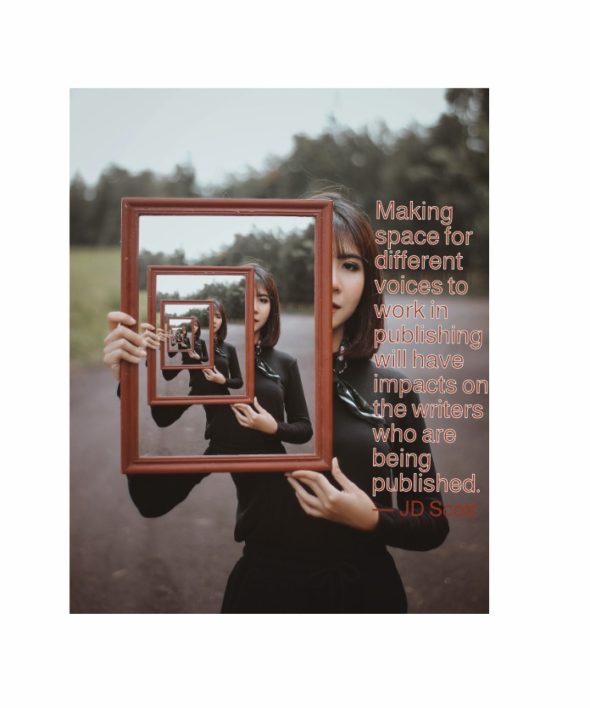 JD Scott — whose debut collection, Moonflower, Nightshade, All the Hours of the Day is included in the Innovative Worlds storybundle, available until August 27th, shares a few views about innovation and some of the challenges of completing the collection.
JD Scott — whose debut collection, Moonflower, Nightshade, All the Hours of the Day is included in the Innovative Worlds storybundle, available until August 27th, shares a few views about innovation and some of the challenges of completing the collection.
Does speculative fiction have a role in innovation? If so, what is it?
JDS: Of course—being able to ask “what if…?” is an activation of the imagination. To be able to imagine new worlds or better worlds can create pathways or percussions that interact with other parts of our culture. Speculative writers exist in a type of biomimicry, where our questions can lead to answers by thinkers in other fields.
What innovation does publishing most need right now?
JDS: Public conversations that have happened throughout 2020 so far have shed light on what many of us have already talked about in private: publishing needs more equity and transparency from the top-down. Publishers, agents, and editors should be actively seeking out work from BIPOC and trans writers. At the same time, we need more transparency with how these writers are being approached and being paid beside their counterparts. Similarly, one way to do this is to hire agents and editors who have typically been left out of the conversation. The annual “Diversity in Publishing” statistics reveals that publishing continues to be overwhelmingly made up of cis, heterosexual, non-disabled, straight white women. Making space for different voices to work in publishing will have impacts on the writers who are being published.
Beyond the writers themselves, I also wish there was more bridge-building between the small press and the Big Five, between indies and academies. There are strategies and ideas from these individual nodes that might be useful in other spaces if more cross-pollination occurred.
What was the most difficult story to write? Why?
JDS: Each story in the collection had their own individual challenges, but “After the End Came the Mall, and the Mall Was Everything” comes to mind specifically because of its length. I wrote poetry before I ever made an attempt at fiction, so there was a certain amount of comfort in concision for me. This was the first truly long-form work I wrote: a novella of 20,000+ words. It leans into many different genres, from adventure to fantasy to horror to fairy tales to literary fiction. I had to challenge myself to approach my relationship with fiction in a new way because of the length, considering a type of magnitude and perseverance that had eluded me previously.
Describe this work in 3 words.
JDS: Elusive, deceptive, zesty.
Name one darling you killed before the final draft.
JDS: Originally the story collection was twelve pieces, and it was edited down to ten. Coincidentally, one of the darlings that was killed was arguably the most speculative story. It involved a world in which humans’ ages were frozen and natural death was abolished. In the story, it’s found out that a virus found in common pigeons is unfreezing people, causing them to resume aging. The main characters, a couple, face challenges when one of them continues to harbor pet pigeons on their city apartment’s rooftop. Unfortunately, I felt the chronology was too confusing and that the characters’ relationships paralleled other relationships that were handled better in other stories, so the darling was killed.
Do you have any writing tics?
JDS: Pacing in circles at home while I’m thinking/writing in my head is something I’ve always done.
What’s your approach to worldbuilding?
JDS: I find that worldbuilding of the intuitive sort works best for me—something that happens on the page—an idea in the moment. There is something pleasurable about meticulously planning elsewhere, but I find those oneiric activities—at least in my case—can go too far to the point where the real writing never gets started because too much time is spent in the margins and side notes tracking minutiae.
Revolution Series Available at Excellent Online Indie Bookshops
I’m proud of the partnerships I’ve forged with online indie bookshops. These shops makes it easier for readers to find the stories and characters that will, for a time or forever, live in their minds and become part of their lives. The people running the shops have a passion for literature and introducing readers to new worlds. In that regard, 2020 has been a good year. Both Sistahscifi.com and Scarlet Ferret now offer the books in the Revolution world: R/evolution and Evolution — Sistahscifi has the paperbacks and Scarlett Ferret the ebooks. If you didn’t know, now you know.
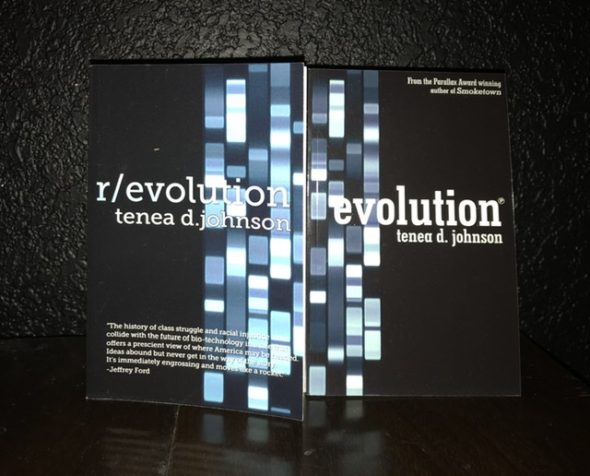
3 Minutes with Larissa, Author of When Fox Is A Thousand

Original Photo by Martin Damboldt from Pexels
Next up from the Innovative Worlds storybundle we have award-winning author, Larissa Lai whose novel When Fox Is A Thousand is included. She stops by to drop knowledge about some innovations the world needs right now and some of her writing goals.
What innovation do you think the world most needs right now? The US?
LL: I think the world needs a viable imagination for how to get out of deepening patterns of strong arm rule, cruelty and oppression. It needs a form of media that people will write/read/watch/hear/speak to/listen to with engagement and interest that at the same time allows for and encourages complex, nuanced, compassionate and respectful conversation. These things would be good for the US too.
Does speculative fiction have a role in innovation? If so, what is it?
LL: I think speculative fiction is key to positive social change. Fiction writers in general have the gift and responsibility of being able to think dialogically. Speculative fiction writers have the additional gift and responsibility of being able to imagine new or different worlds, technologies, and futures. The speculative fiction traditions of utopia, dystopia and what the Tom Moylan has called critical utopia can be especially useful right now.
What’s your favorite innovation of the last 25 years? The last 5?
LL: How about the last 50? I like the brooder in Marge Piercy’s Woman on the Edge of Time. Not because I actually want one, but I really appreciate the social direction that innovation turned us towards. This is a fictional innovation obviously.
Who’s the greatest innovator of your lifetime (public or personal)?
LL: Octavia Butler, because of her capacities to dream us into the future in relationship across racial difference, as imperfect but compassionate beings.
What innovation does publishing most need right now?
LL: We need a more robust, intelligent, compassionate, generous, and broadly engaged review culture than what we have right now, one that can productively expand and deepen our conversation about books. I hope this will expand and deepen the way we live together in these difficult times.
Right now in the US, there’s the struggle with the pandemic, what some are calling a racial reckoning and a hotly contested, crucial race to decide who will be the next president, what part can fiction and storytelling play in such times? How can it contribute or detract?
LL: I think the social speculative fiction strain that ran strong in the 1970s and at present can be really useful to help us think through the consequences of any potential choices, actions, or organizing work we do right now. I think particularly of Ursula LeGuin and her idea of the literary experiment, which changes one (or more) things in our present world and uses the novel to test it out. One can test out things in in novels without hurting real people. But of course, because they are part of the real world, novels can spark things in it that can change it. So we must be careful!
What was the most difficult story/part of your novel to write? Why?
LL: The contemporary “Artemis” sections. These were difficult perhaps because they were closest to home, at the time of writing.
How do you measure writing success?
LL: When I wrote When Fox Is a Thousand, I wanted it to empower other young people like myself (as I was then). By this I mean the generally BIPOC, GBLTQ2S+ communities through which I moved (and still move). I wanted other young Asian women to find something of and for themselves in the book. These days, while those concerns are still important, I want my writing to more than that. By more, I mean I want it to build relationships. If it also gives us an inkling of how to live better together, that would be wonderful.
dash—dash
3 Minutes with Maurice, Author of Pimp My Airship
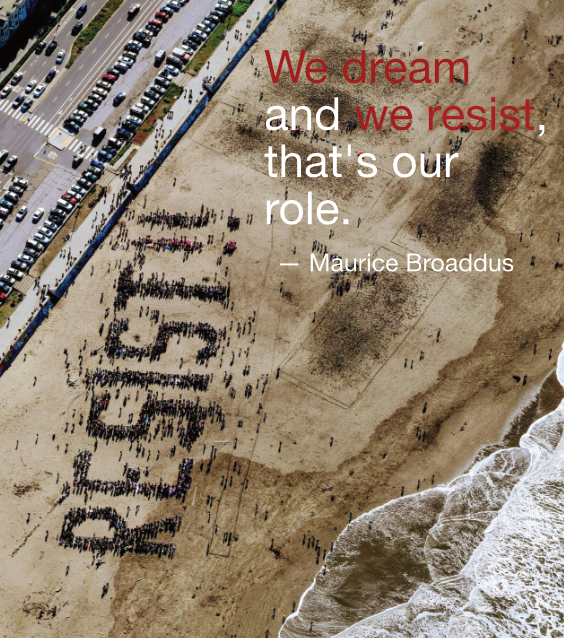
Original photo by Tim Gouw on Pexels
While the Innovative Worlds storybundle is going on (until August 27th), I’ll be sharing a little about some of the other authors in the bundle. We begin with Maurice Broaddus. His novel, Pimp My Airship, which started as joke on Twitter but evolved into something much more, is in the bundle.
What innovation do you think the world most needs right now? The US?
MB: A new economic system. One that values people and relationships first. The arts and teachers as the bedrock of our culture and way of doing things. The innovation needed is social: how we see, know, and celebrate people.
Does speculative fiction have a role in innovation? If so, what is it?
MB: Absolutely. We’re the dreamers. We cast the vision of what life, the future, different worlds could look like. People have trouble charting a course when they have no idea where they are going. Writers create a roadmap for what we could work toward.
Right now in the US, there’s the struggle with the pandemic, what some are calling a racial reckoning and a hotly contested, crucial race to decide who will be the next president, what part can fiction and storytelling play in such times? How can it contribute or detract?
MB: We’re also the mirror. One of the things we often talk about is how Afrofuturism is rooted in the past, critiques the present, all while imagining a better tomorrow. Being rooted in the past means being aware of the history, how we got here. All the stories. Critiquing the present by continuing to tell the stories, especially from those corners and peoples who have been marginalized (because nothing better illustrates a power/empire than how it treats the most powerless of its citizens). And imaging a better tomorrow … to paraphrase author Tananarive Due, even the act of imagining ourselves in the future is an act of resistance. We dream and we resist, that’s our role.
What was the most difficult story/part of your novel to write? Why?
MB: Pimp My Airship had two areas that were difficult. The first was that it was a steampunk story with an all-black cast. That hadn’t been done. I wasn’t certain what the rules/conventions were of the genre. Then ultimately I had to trust myself and toss out the playbook (since playbooks rarely serve us anyway). The second was turning the original short story into this novel. I’d never done that before. So it became an exercise in continuing to push my imagination.
What’s on your desk?
MB: A notepad. A pen. A superhero mat. A nameplate that reads “I’m Kind of a Big Deal” (a present from my wife). Books: The Wretched of the Earth (Frantz Fanon). Sapiens (Yuval Noah Harari). Blended (Sharon M. Draper). The Hate U Give (Angie Thomas). The City We Became (N.K. Jemisin).
How do you measure writing success?
MB: Did I finish the story.
Do you have any writing tics?
MB: I write long hand. On colored tablets. (Today’s color is green … do you know how hard it is to find green notepads?)
What’s your approach to worldbuilding?
MB: I have one job: to out-imagine the reader. So every writing project, it’s “Game on!”
A Minute with Authors and Architects of Innovative Worlds

Now that the bundle has launched a bit of context: I wanted to put together an Innovative Worlds storybundle for reasons both personal and professional. All of those reasons pertain to all of us. Fitting then that we start the author conversations that I enjoy as much as curating the bundle with the responses of some of the excellent authors and editors who have been gracious enough to take part. Here are their answers to “Does speculative fiction have a role to play in innovation? If so, what is it?”
JD Scott: Of course—being able to ask “what if…?” is an activation of the imagination. To be able to imagine new worlds or better worlds can create pathways or percussions that interact with other parts of our culture. Speculative writers exist in a type of biomimicry, where our questions can lead to answers by thinkers in other fields.
Larissa Lai: I think speculative fiction is key to positive social change. Fiction writers in general have the gift and responsibility of being able to think dialogically. Speculative fiction writers have the additional gift and responsibility of being able to imagine new or different worlds, technologies, and futures. The speculative fiction traditions of utopia, dystopia and what Tom Moylan has called critical utopia can be especially useful right now.
Bill Campbell: Whenever I run into someone who says that they don’t like speculative fiction, I tell them whatever device, etc., they see in the world was first thought up in a book. But perhaps more importantly, there are questions and problems in the past, present, and future that many authors have wrestled with in their works. That’s what makes the genre so fascinating. Perhaps asking those questions is our role.
Ginn Hale: I think that it does. I know people often cite occasions when fiction has inspired people to realize an invention or a profession. But I think fiction—particularly fantastical and speculative fiction, encourages innovation in another way as well. It helps them imagine the improbable and impossible as achievable possibilities. When readers engage with speculative fiction they practice thinking beyond the world they know to explore new paradigms. They experience alien problems and otherworldly solutions. And above all, they get to enjoy that sense of engaging with the new, unknown and unexpected. All of which, I believe, fosters a greater comfort and excitement with original concepts and innovations.
Eileen Gunn: Speculative fiction has a number of roles in innovation. (1) To young readers, at a stage when their ideas about the world are being formed, it celebrates innovation as an important force in creating our world, and it frequently makes the point that young people can drive innovation, that they can come up with ideas that make a positive difference in people’s lives. A number of prominent scientists and technologists have been inspired to enter their chosen field by reading speculative fiction as children. (2) For all readers, speculative fiction generally inculcates the idea that innovations, new ways of doing things, are to be encouraged, not feared. Humanity is always pulled between the safety of the old, tried-and-true ways of doing things, and the adventure of new, possibly risky ideas and techniques. Speculative fiction often encourages people to accept risk and do something new. (3) The problems and solutions envisioned in speculative stories have inspired scientists, technologists, social thinkers, and many other innovators to tackle those problems themselves. Sometimes their solutions were congruent with those in the stories, and sometimes they were very different, but the innovator’s attention was drawn to the problem by speculative fiction.
Maurice Broaddus: Absolutely. We’re the dreamers. We cast the vision of what life, the future, different worlds could look like. People have trouble charting a course when they have no idea where they are going. Writers create a roadmap for what we could work toward.
And tomorrow we journey down that road, beginning where we end today: 3 Minutes with Maurice Broaddus. If you’d like to go a bit further the bundle is available until August 27th.
Broken Fevers Cover Reveal
Quite pleased to share the cover of my upcoming collection, Broken Fevers, out from Rosarium Publishing in November. Art by Nettrice Gaskins and title design by Bizhan Khodabandeh. I think they did a fantastic job.
Audio Interview
Hey, all. This serves as a good intro to some audio projects slated for 2020, and to me: my first audio interview.
The Seers Table: Dark Love from the Horror Writers Association
The seers saw me. The Horror Writers Association has shined a light on me and a trio of other authors. Thanks to Tish Booker, who I sufficiently disturbed to merit consideration. She clued in on themes that will find life in a new professional expansion. More on that later. For now, pull up a chair to The Seers Table
Happy Hunting
A humbling weekend. You know when you find a typo in your book? Know when you find a WTF in your book? I hope not. For it is the shit, and not the good kind; it is the in-the-shit kind. Regardless. Let’s make Shinola out of shit. If you already have a copy of the Evolution ebook and can find the WTF, send word here with your best guess. If you’re correct you’ll be one of the first 70 to have a listen to The Lost Recordings, the last of the Rep War World series, at the end of year. Given that, this offer is good until 12/31/19.
NOTE 1: As you can imagine it’s not in the ebook currently up at Amazon, so this game already has its players. NOTE 2: There’s a totally intended bit of disjointed foreshadowing in Evolution, but not this particular gem. NOTE 3: There’s a clue in this post. Happy hunting.
Evolution Review
Evolution’s first review is in: Apart from a story arc that spans the best part of 200 hundred years, there’s one particular aspect that stands out most clearly about Evolution. Johnson writes hope into her work. She builds it in, gently, quietly, without fanfare. It isn’t obvious at first, just a soft nudge here and there—in the face of gassed populations, dengue fever and total injustice, you think you’re mistaken at first. Around every page turn, you’re expecting disaster, and there are enough of those to justify the lack of belief you have that hope could even be a thing in such a world. But keep reading.For that, Johnson is currently my total writing hero….
Revolution: The Lost Recordings
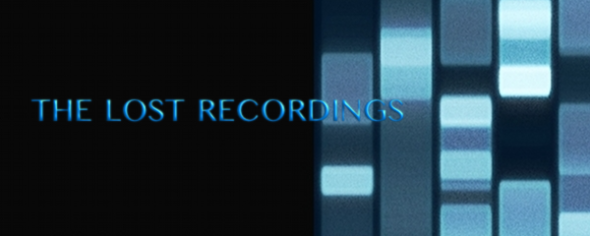
Revolution came first, then exclusively in the Afrofuturism storybundle,the Evolution ebook. On the horizon, Evolution in print and The Lost Recordings. Here, a bit of the latter.
Afrofuturism, Best of and Next Up
Here, a miniretrospective: On this last day of the storybundle, current Afrofuturist authors/editors share their favorite works and what they’d like to see in Afrofuturism’s future.
What’s your favorite Afrofuturist work?
Octavia’s body of work. It’s hard to pick. Wild Seed, Kindred, Parable of the Sower, Xenogenesis Trilogy, etc.
—Andrea Hairston
It’s a tie between Octavia Butler’s Mind of My Mind and her short story, “The Evening, the Morning, and the Night.” The first is a novel, the latter a short story. I’d call them some of her lesser known works but for me, they are so efficient and clean, with an emphasis on the joy of the plot, that they’re hidden gems. No offense to Parable of the Sower or the other more stand out works by Ms. Butler, but I like a tight stand-alone narrative with no wasted plot points, characters, or words. And she delivers with those two tales.
—Ayize Jama-Everett
This is an easy one, Dawn by Octavia Butler.
—Nicole Givens Kurtz
Empire Star, by Samuel R. Delany. It’s available from Wesleyan, and I was able to get permission to reprint it in the Lightspeed People of Colo(u)r Destroy SF anthology.
—Nisi Shawl
Well, Sun Ra, is way up there, mindblowing, and there’s so many more, but if pushed, I’d have to go with Samuel R. Delany’s Babel-17, which I bought well-worn from a street bookseller in Harare when I was 16.
—Ivor Hartmann
What direction would you like to see Afrofuturism go in? What would you like to see come of this Afrofuturism moment?
I want Afrofuturism to go every direction. I want the Afrofuturist moment to last a very long time!
—Andrea Hairston
Oh, we a movement now? Awesome. I want reparations then. I kid. Not really. Seriously though I’m not sure what people mean by a movement. I mean, are there Afrofuturist publishers, agents, cinema houses, and lawyers? Do we have a Samuel Delany Center for the Study of Afrofuturism and its offshoots going somewhere? If so, awesome. If not, I think it’s just a popular cultural phase right now. Don’t get me wrong, I’m glad a lot more folks are getting the shine on their names. Folks that have been grinding for years at this are finally able to eat off of it. I hope to one day be among them. But even so, I know that the diversification of both approach and narrative are key in order to stay fed. I think about Jordan Peele. The man started out on MADtv. And after over a decade he made a blockbuster on a shoestring budget, which can only nominally be called sci-fi. But folks are claiming him as Afrofuturist royalty. Awesome! The more the better. But is it about Afrofuturism or just finally acknowledging that black people who create in this country and throughout the world do so with more than white audiences in mind? Maybe publishers, agents, editors, producers, and directors are finally just coming to realize that the same weird, creepy, and geeky things that have obsessed the dominant culture have also intrigued black creatives and audiences. And sometimes, our approaches to said weirdness are more intriguing than the standard fair. You want to call that a movement? Cool. Me, I say it’s just awesome people of color continuing to do what we’ve always done, only now some of us are being recognized for it.
—Ayize Jama-Everett
I would like to see Afrofuturism continue to incorporate all areas of media. I would love to see more TV and film media embrace authentic Afrofuturism. Black Panther had the backing of Disney, but many independent filmmakers are producing quality works but cannot get the distribution. How do we harness that hunger to our advantage? How do we connect those people who adored Black Panther to our independent works? I want to see the movement embrace all Afro-centric stories, not just those rooted in Africa, but from the other countries in the diaspora, including the U.S. Most importantly, there is amazing work being created in comics, novels, films, and music, but have not reached the audience necessary to be as big as I think it can be.
—Nicole Givens Kurtz
3 Minutes with Andrea, Author of Will Do Magic for Small Change
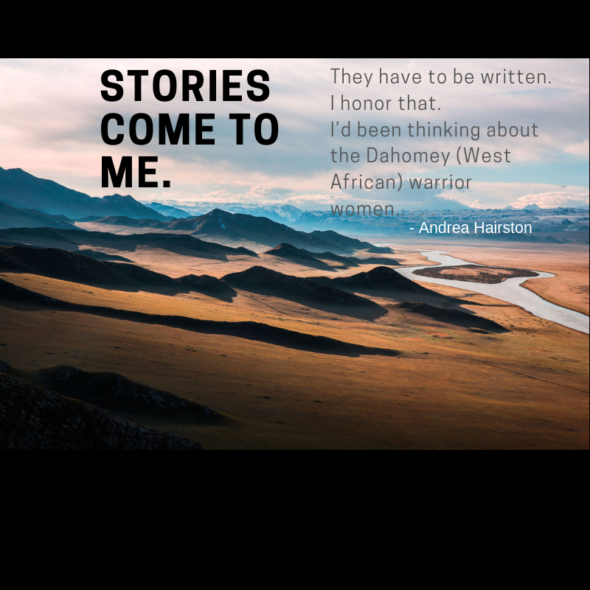 With just a little over a day left on the Afrofuturism storybundle Andrea Hairston shares her thoughts on working in different forms and the intersection of Will Do Magic
With just a little over a day left on the Afrofuturism storybundle Andrea Hairston shares her thoughts on working in different forms and the intersection of Will Do Magic
How does being a playwright inform your work?
I am a dramatic storyteller. Drama is about the poetry of action. Meaning is in the juxtaposition of actions, in the clash of character choices and consequences. Theatre is about embodying the other—acting who you are not, writing another world, experimenting with reality. Theatre takes me right to speculative world building and stories beyond mimetic realism.
Why this story?
Stories come to me. They have to be written. I honor that.
I’d been thinking about the Dahomey (West African) warrior women who supposedly appeared at the Chicago World’s Fair for a long time. There’s a moment in an earlier novel, Redwood and Wildfire, where they also appear. So why not have an alien from another dimension meet them and learn the world from their perspective? Why not connect Redwood and Wildfire’s granddaughter with the alien?
Describe this work in 3 words.
Alien Ancestor Theatre-magic
How do you measure writing success?
Success is telling the stories you want to tell, how you want to tell them.
Success is challenging yourself and showing up every day for that challenge.
Success is having the generosity of spirit and the humility to connect with and support other artists.
Success is never giving up on getting better, but taking pleasure in what you have achieved.
3 Minutes with Ayize, Author of The Liminal People

Ayize Jama-Everett’s The Liminal People is also featured in the Afrofuturism Storybundle. Here, a closer look at writing and the work:
How does liminality manifest in your life?
How does it not?! I’m forever between the now and the later, the done and the doing. It’s a character trait flaw that makes contentment an accomplishment for others and not myself. Despite being born black in Harlem to politically minded folks, I used to refer to myself as a Black Cultural Refugee, before black geeks became cool. I have three master’s degrees and no Ph.D. I’m in the middle of the world and my understanding of it. Yes, liminality is manifested in my life.
Describe this work in 3 words.
Traveled. Troubled. Family.
Why this story?
This story was a compromise between the expansive multi-dimensional tale I wanted to tell and the intimate close narrative that the epic needed to be based in. It’s been a long and strange balancing act.
What subject do you find most difficult to write about? The most effortless?
Can they be the same thing? I love writing about fights and food. My next novel should be about food fights. But the choreography of physical combat and the innate sensualness of anything that is offered to the mouth make the writing effortless and enjoyable. I tend to stay away from real life events though I have experimented. Nonfiction is probably something I should push myself to write more but I think I need to hang in some plain old narrative fiction for a while before I do that. The idea that a mundane life can be worthy of insight given the proper attention to the craft of writing is not revelatory but expansive for a kid who grew up reading sci-fi and comics.
Hey Writers, What’s on Your Desk?
From some of the Afrofuturism storybundle authors–
Andrea Hairston, author of Will Do Magic for Small Change
The Age of Surveillance Capitalism: The Fight for a Human Future at the New Frontier of Power by Shoshana Zuboff
Braiding Sweetgrass: Indigenous Wisdom, Scientific Knowledge and the Teachings of Plants by Robin Wall Kimmerer
The Bird King by G. Willow Wilson
New Suns anthology edited by Nisi Shawl
Mama’s Last Hug: Animal Emotions and What They Tell Us about Ourselves by Frans de Waal
Beyond Words: What Animals Think and Feel by Carl Safina
Sweat a play by Lynn Nottage
Flyin’ West a play by Pearl Cleage
Black Nature: Four Centuries of African American Nature Poetry edited by Camille Dungy
Ayize Jama-Everett, author of The Liminal People
What is this desk you speak of? :) I don’t do the “a clean well lit place” sort of thing. Mostly because my life has been in a unique form of free fall for the past two years (MFA land). Instead, I grab a laptop, hope the battery is good enough, find a caf,e buy the cheapest cup of tea I can find, and get to writing. usually, I’ve got headphones on. sometimes, I write in my car, parked by a park. In the past, I’ve written on index cards because that’s what one of my heroes did. So there is no desk, only the writing.
Nicole Givens Kurtz, author of Silenced
My laptop, my legal pad, and coffee if it’s morning, iced water if it is noon, and wine if it’s after 6 p.m.
Nisi Shawl, author of Filter House
Mounds of notebooks I make my way through dexterously. A defunct printer. A cigar box full of business cards. A small purple plastic chest full of beaded sea creatures, paperclips, kaleidoscopes, key rings, white out, and thumb drives. A tin snake from Mexico. A lapis lazuli egg. A Lego mermaid. A Lenovo ThinkPad. A box cutter. An empty baking powder can I use as an ashtray. An empty baked bean can I use as a pencil holder. A goosenecked lamp with additional pencil-holding compartments built into its base. My make-up kit. Three potted plants. (It’s a very big desk.)
Ivor Hartmann, editor of AfroSF
Too much as per usual and that’s how I like it, but I am currently reading Jennifer Nansubuga Makumbi’s Kintu.
